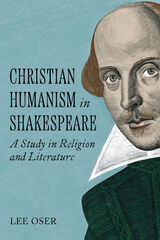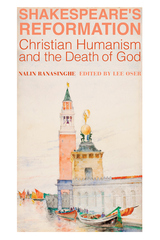2 books about Christian Humanism

Christian Humanism in Shakespeare
A Study in Religion and Literature
Lee Oser
Catholic University of America Press, 2022
Shakespeare, Lee Oser argues, is a Christian literary artist who criticizes and challenges Christians, but who does so on Christian grounds. Stressing Shakespeare’s theological sensitivity, Oser places Shakespeare’s work in the “radical middle,” the dialectical opening between the sacred and the secular where great writing can flourish. According to Oser, the radical middle was and remains a site of cultural originality, as expressed through mimetic works of art intended for a catholic (small “c”) audience. It describes the conceptual space where Shakespeare was free to engage theological questions, and where his Christian skepticism could serve his literary purposes. Oser reviews the rival cases for a Protestant Shakespeare and for a Catholic Shakespeare, but leaves the issue open, focusing, instead, on how Shakespeare exploits artistic resources that are specific to Christianity, including the classical-Christian rhetorical tradition. The scope of the book ranges from an introductory survey of the critical field as it now stands, to individual chapters on A Midsummer Night’s Dream, The Merchant of Venice, the Henriad, Hamlet, and King Lear. Writing with a deep sense of literary history, Oser holds that mainstream literary criticism has created a false picture of Shakespeare by secularizing him and misconstruing the nature of his art. Through careful study of the plays, Oser recovers a Shakespeare who is less vulnerable to the winds of academic and political fashion, and who is a friend to the enduring project of humanistic education. Christian Humanism in Shakespeare: A Study in Religion and Literature is both eminently readable and a work of consequence.
[more]

Shakespeare's Reformation
Christian Humanism and the Death of God
Nalin Ranasinghe
St. Augustine's Press, 2022
This is a posthumously published collection of Nalin Ranasinghe's sharp analyses of Shakespeare's five heavy dramas: Hamlet, King John, Julius Caesar, King Lear, and Antony and Cleopatra. True to form, Ranasinghe serves up philosophical and literary genius for the reader's benefit and delight.
"I will try to claim that Shakespeare offers an esoteric vindication of the human soul itself, not merely poetry, against the looming backdrop of the Counter-Reformation in Europe and the Puritan perversion of English Anglicanism. Neither the Scholasticism of the former nor the fundamentalism of the latter had any sympathy for the claims of men like Bottom or the Bastard to see beyond the confines of scripture and sacred social structures. While poetry could indulge in metaphysical fantasy, it could not take on the status quo without the assistance of more learned allies; this Shakespeare seems to do by his re-telling of Classical and English history. As disingenuous as Bottom (or Erasmus) in this artful use of ignorance and folly to conceal his serious goals, Shakespeare is thus tying poetry to history and giving us an alternate, if playful, account of Western Civilization."
"I will try to claim that Shakespeare offers an esoteric vindication of the human soul itself, not merely poetry, against the looming backdrop of the Counter-Reformation in Europe and the Puritan perversion of English Anglicanism. Neither the Scholasticism of the former nor the fundamentalism of the latter had any sympathy for the claims of men like Bottom or the Bastard to see beyond the confines of scripture and sacred social structures. While poetry could indulge in metaphysical fantasy, it could not take on the status quo without the assistance of more learned allies; this Shakespeare seems to do by his re-telling of Classical and English history. As disingenuous as Bottom (or Erasmus) in this artful use of ignorance and folly to conceal his serious goals, Shakespeare is thus tying poetry to history and giving us an alternate, if playful, account of Western Civilization."
[more]
READERS
Browse our collection.
PUBLISHERS
See BiblioVault's publisher services.
STUDENT SERVICES
Files for college accessibility offices.
UChicago Accessibility Resources
home | accessibility | search | about | contact us
BiblioVault ® 2001 - 2024
The University of Chicago Press









